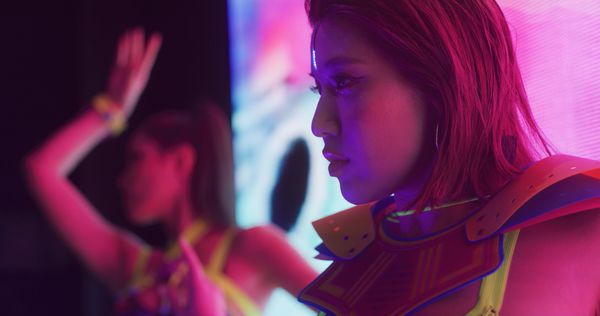Eye For Film >> Movies >> Dreams On Fire (2021) Film Review
Dreams On Fire
Reviewed by: Jennie Kermode

In 2018, AyaBambi troupe star Bambi Naka broke hearts across Japan when she announced that she was giving up dancing. She had already found a new career, however, and if this film is anything to go by, she'll have no difficulty carving out a career as an actor. She plays a young woman, Yume, who wants to become a dancer, so it's arguably safe territory for her, but Philippe McKie's film still requires her to work hard in other ways and her performance is vital to its success.
Yume grows up in an unhappy home and heads for the big city to seek her fortune, convinced that if she does her best and just keeps trying then one day her dream will come true. With this synopsis, you might think you were going to be watching a Disney movie, but this is very, very different in tone. It's one of very few films about building a career in the arts that shows it like it really is: neither a straight climb to the top nor a long wait for a big break, but a life that requires juggling multiple jobs and opportunities at the same time, often struggling with too much work because one won't be able to pay the rent if one risks having too little. In typical fashion, Yume utilises her skills in a number of very different ways, and by the time she's starting to win real respect for what she does, she's a very different person from the wide-eyed country girl she was to begin with.

No attempt s made to hide here from the uglier side of life. There's a suggestion that Yume has been subject to violence in her childhood home. in Tokyo, the first job she's able to get is as a hostess, dressing in a little sailor suit, pouring drinks for men, laughing and pretending that she finds them interesting. Her boss doesn't abuse her but exploits her in a way that low paid workers the world over will be familiar with. She learns how to handle day to day pushiness and unwanted touching from customers, but it's not at all clear that anyone will have her back if things really go too far.
Things finally begin to look up when Yume finds her way to Shinjuku Ni-chome, where a very different attitude to bodies, sex and sexuality makes her much safer and encourages her to start exploring not just what she needs to do to survive or purse her dream, but what she actually wants. Developing her own style brings her into contact with numerous others and there are some fantastic party scenes showcasing the fantastic costumes and artistic creations to be found in the district's leading clubs. Yume discovers a different side to her character and a different way of looking at relations between men and women. Though there are still difficult times ahead, she begins to flower as a person.
This tour through different places, jobs and subcultures allows McKie to include a range of very different dance scenes, most of which segue easily into the narrative. Bambi can handle them all with ease, but knows when to hold back early on, letting us see how Yume develops physically as well as psychologically, with good costume choices concealing her muscle until she's had time to earn it. This also lets Bambi communicate through dance, expanding her emotional range and reminding the viewers of why this dream is so important to a girl who grew up feeling that she didn't have a voice.
Impressive in its ability to balance idealism and realism, this is one film about pursuing a dream that might actually be useful to people thinking of doing so themselves. It's also an engaging snapshot of the Japanese entertainment scene and the changing social attitudes it reflects.
Reviewed on: 27 Feb 2021















